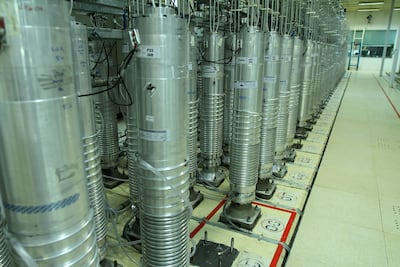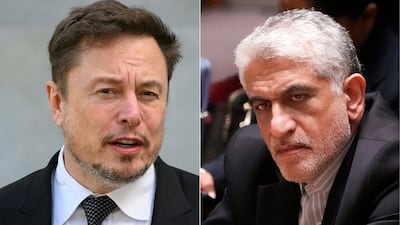Elon Musk has held talks with Iran’s envoy to the UN, Amir Saeid Iravani, with reports suggesting the meeting was an effort to reduce tensions between Washington and Tehran, after Donald Trump was re-elected as US president.
Mr Musk is set to help lead a government efficiency agency under the second Trump administration, which begins in January. The meeting with Mr Iravani, which took place on Monday, was “positive”, The New York Times reported on Thursday.
The tech billionaire, who became a close ally of Mr Trump during the election campaign, has been vocal on major foreign policy issues, including the Ukraine war, expressing the belief that Moscow and Kyiv can strike a peace deal. The SpaceX chief executive has also supplied Starlink internet terminals to Iran, with the technology providing free internet access from satellites in low-earth orbit, but authorities in the country have claimed it is part of a CIA plot.
Mr Musk’s talks with Mr Iravani came amid growing international pressure on Iran. The US has called for "actual behavioural change and action" from Iran over its nuclear programme and its support for proxy groups including Lebanon’s Hezbollah and the Houthi rebels in Yemen, State Department spokesman Vedant Patel said.
Nuclear research row
Mr Patel's statement followed a visit to Tehran by UN nuclear watchdog chief Rafael Grossi to discuss “a situation of tension” over the country’s atomic ambitions. Experts, including scientists at the International Atomic Energy Agency, have warned for nearly two years that Tehran is close to having enough highly enriched uranium to develop a nuclear bomb. Iran has long insisted that it does not intend to make a weapon.
Critics say Iran has built vast plants underground that can enrich uranium to more than 90 per cent purity. A civilian nuclear reactor requires uranium enriched to up to five per cent.

Talks between Iran and global powers to revive a nuclear deal have stalled amid the devastating Gaza war, which began in October last year. Iran signed an agreement in 2015 that limited its atomic programme in exchange for relief from some sanctions, but the deal collapsed after the US – under the presidency of Mr Trump – withdrew in 2018.
Tension rose sharply between Iran and the US during Mr Trump's first term in office, which included the assassination of senior Iranian commander Qassem Suleimani in 2020. The strike brought the two sides to the brink of war.
There are also growing fears that Israel could launch a major attack on Tehran's nuclear sites, after Iran last month faced a major bombardment in retaliation for a missile attack.


